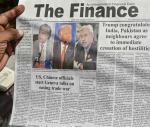You are here
‘Bad news for both Syria and Cyprus’
Apr 02,2014 - Last updated at Apr 02,2014
The triumph of Turkey’s fundamentalist Freedom and Development Party (AKP) in local elections is bad news for both Syria and Cyprus.
The AKP’s success is certain to embolden Prime Minister Recep Tayyip Erdogan to stand for president in the country’s first presidential election, and to maintain hardline policies towards Damascus and Nicosia.
The AKP won 45 per cent of the vote, while its rival, Republican People’s Party, took only 29-30 per cent.
Since commentators regarded the AKP’s victory as a referendum on Erdogan’s rule, he naturally assumed personal responsibility for the achievement at a time the party is under considerable challenge from both left and right.
On the domestic front, Erdogan and the AKP face serious allegations of corruption over the awarding of contracts and breaching sanctions on Iran by paying for that country’s oil with gold transfers.
He has launched a sweeping purge of the police and judiciary with the aim of removing appointees loyal to the Hizmet movement headed by US-based Fethullah Gulen, a former AKP ally turned enemy.
On the external front, Erdogan has forged tricky relationships with Tehran and Erbil.
He has tried, and failed, to mediate between Iran and the West over its nuclear programme, and has exploited differences between Baghdad and Erbil, the capital of the Kurdish autonomous region, over oil exports.
On Syria, Erdogan and Foreign Minister Ahmet Davutoglu adopted an interventionist policy unpopular with a large percentage of Turks and castigated by the secular and nationalist opposition parties.
During the spring of 2011, Erdogan and Davutoglu committed Turkey to the overthrow of Syrian President Bashar Assad.
During July and August of that year, Ankara fostered the formation of the rebel Free Syrian Army and the expatriate opposition Syrian National Council.
Turkey also provided bases for defected Syrian soldiers and officers, trained and armed them and sent them back across the border to battle government forces.
An office for funnelling funds and aid to the rebels was established in Ankara.
The US Central Intelligence Agency was soon involved in vetting recipients of “non-lethal” US aid, including medical kits and communications equipment.
The government also, as they say, “turned a blind eye” to the transit traffic of Syrian, Arab, Asian and Western fighters across Turkish territory into Syria.
Turkish media reported that arms were furnished by Turkey to the fighters.
Turkey shelled Syrian army positions with mortars and shells landed on Turkish territory.
After Syrian air defences shot down a Turkish warplane overflying Syrian territory, Turkey responded by bringing down a Syrian helicopter.
But the era of tit-for-tat strikes and indirect involvement may be coming to an end.
Ahead of the municipal elections, YouTube broadcast a recording of a security meeting at which senior government, military and intelligence officials discussed a “false flag” operation involving the creation of a pretext for direct Turkish military intervention in Syria.
The meeting was attended by Davutoglu, intelligence chief Hakan Fidan, deputy chief of military staff Yasser Guler and other senior officials.
Responding to the leak, Davutoglu confirmed that the meeting had occurred and accused those who leaked it of conducting a “cyber attack ... against the Turkish Republic”, while Erdogan charged the leakers with being “traitors”.
YouTube was shut down just as Twitter had been interdicted for carrying conversations between Erdogan and his son Bilal about disappearing millions of dollars acquired through corruption.
The leak about the “false flag” operation preceded the Turkish downing of the Syrian warplane. It had been involved in action against an offensive mounted by Al Qaeda-linked Jabhat Al Nusra and Ahrar Al Sham, a coalition of fundamentalist and local jihadist groups, to seize control of the Kassab border crossing and the village of Kassab, where the Armenian population was expelled and their homes and churches were looted.
The insurgents, who were based in Turkey, reportedly mounted their assault from the Turkish side of the border with the backing of shelling from Turkish artillery and tanks. The insurgents used Kassab to launch attacks on villages en route to the coast in Latakia province, the home territory of the Assad family.
Thanks to Turkey’s connivance, the northern provinces have been largely under insurgent control since 2012, while the government has made major gains in the centre of the country, around Homs and Hama, around Damascus and in the south.
The AKP’s victory could encourage Erdogan and his minions to adopt an even more interventionist policy towards Syria and to continue to press for recognition of the self-proclaimed Turkish Cypriot state in the north of the island, recognised so far only by Turkey.
By doing so, Erdogan would scupper ongoing talks between the Greek and Turkish Cypriot sides aimed at achieving reunification of the island, divided since Turkey invaded and occupied 36 per cent in the north, in 1974.
So far, the talks have produced no meeting of minds, between the Cypriots, but since Ankara calls the shots as far as the Turkish Cypriots are concerned, there is little hope of a deal even if Turkey’s occupation of the territory of Cyprus, a member of the European Union, torpedoes Ankara’s bid to join the bloc.
It may be significant that Turkey not only occupies more than a third of Cyprus but also a strategic tract of Syrian territory — Hatay province, formerly the Syrian province of Iskenderun or Alexandretta. It was united with Turkey in 1939 after a referendum stage managed by Turkey and France, then the colonial power.
At the time of the collapse of the Ottoman empire, Turkey also laid claim to oil-rich Mosul, in northern Iraq. If elected president with enhanced powers, Erdogan may seek to revive this claim as well. His ambition knows no bounds.













